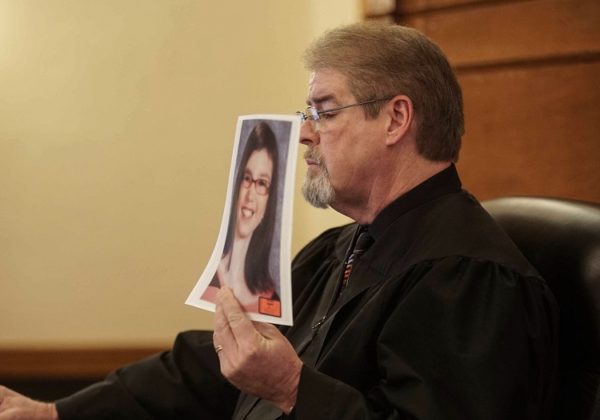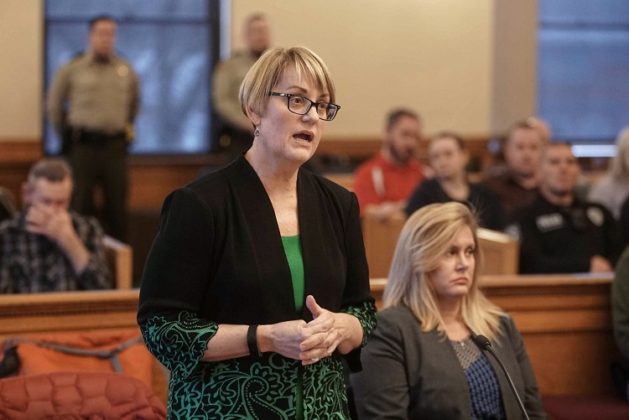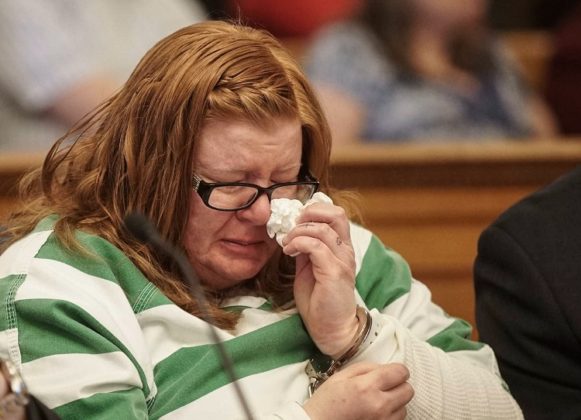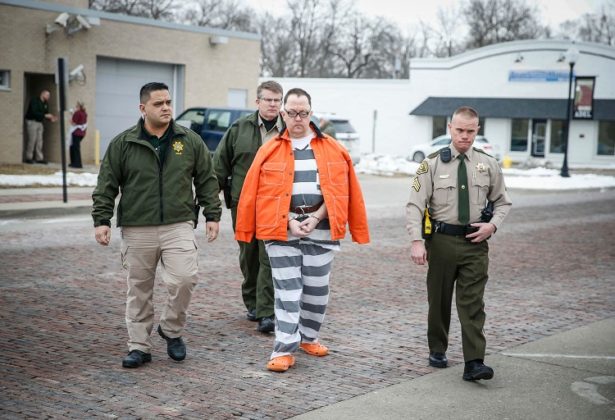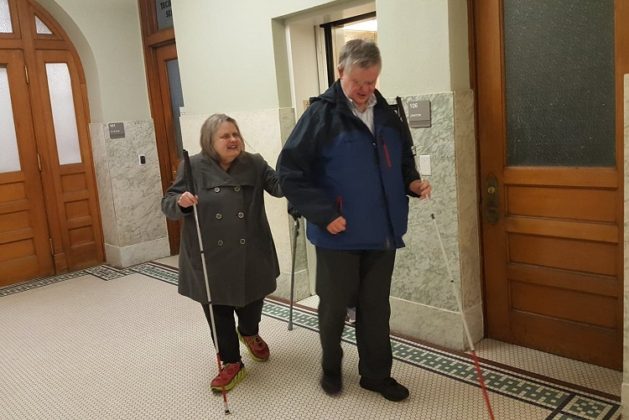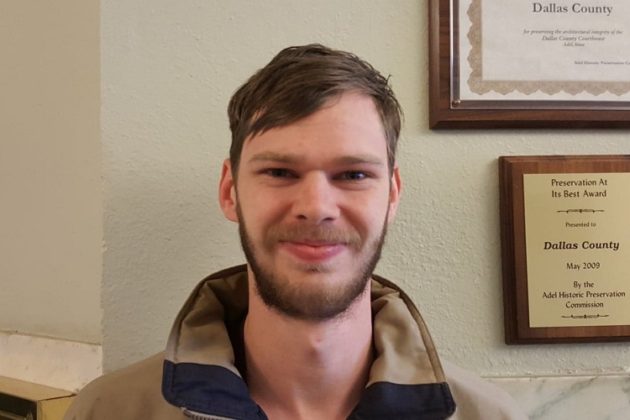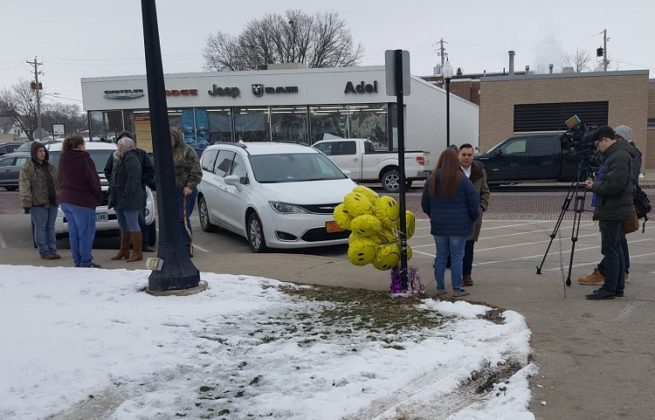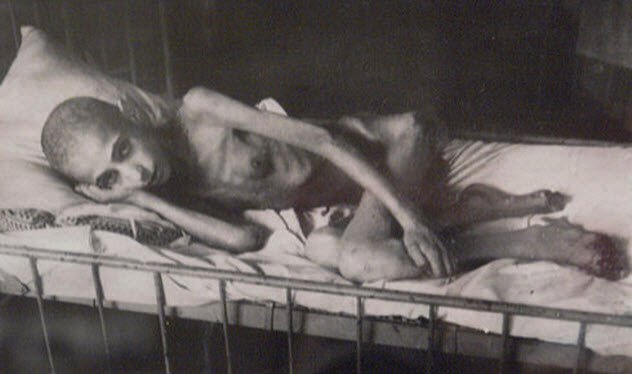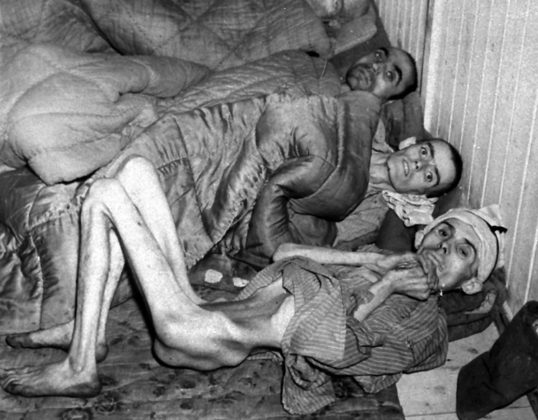ADEL, Iowa — Calling the imprisonment and starvation of their three adopted daughters “cruel and evil,” Dallas County District Court Judge Terry Rickers sentenced Marc Alan Ray and Misty Bousman Ray of Perry Friday to the maximum prison terms provided for their crimes.
A grave silence reigned throughout the morning proceedings in keeping with Rickers’ observation that “basic respect for the victims in these cases requires conducting this hearing with solemnity and dignity.”
Rickers said he felt “a deep, abiding feeling of sadness approaching despair” in pronouncing sentence on the Rays and in weighing their “inexplicable, depraved indifference to the obvious fact that” their starved and badly injured daughter Sabrina, 16, “was helpless and rapidly dying” in May 2017.
The child weighed 56 pounds at death, according to the autopsy report.
The horrendous facts surrounding Sabrina’s suffering and death and the confinement of her younger sisters in the squalid room with the dying girl inspire a strong feeling of revulsion in everyone, even in people with only the ordinarily tender sentiments toward children. We are sickened, perplexed, enraged. But Rickers said the service of justice required him to try to rise above all such passions of horror and disgust.
“In contemplating what to say during today’s sentencing hearing,” he said, “I knew that the court could not allow itself to be overcome by anger or outrage over what happened to the victims in these cases. The administration of justice must be the product of rational thought and reflection and not raw, base emotion. Otherwise, our decisions lack legitimacy, and justice is not served.”
Rickers successfully preserved his dispassionate front during the hour-long hearing, but rawer emotions were plainly visible among the many auditors in the gallery.
Misty Bousman Ray was sentenced to a term of life imprisonment without the possibility of parole after pleading guilty earlier this month to a charge of first-degree kidnapping.
Marc Alan Ray was sentenced to 80 years in prison after pleading guilty in December to a charge of third-degree child endangerment resuting in death and three counts of third-degree kidnapping. The judge ordered him to serve 35 years of the term before he can be considered for parole.
Jailers jailed
“It is certainly ironic,” Rickers said to the Rays, “that your respective decisions to repeatedly and cruelly confine three of your children over a period of time will now result in your extended confinement and in Mrs. Ray’s case, permanent confinement. However, unlike the confinement endured by your children, your confinement will include basic necessities and essentially humane treatment.”
The inhumanity of the Rays’ crimes was a recurring theme in the hearing, from the presentation of the state’s sentencing recommendations by First Assistant Dallas County Attorney Jeannine R. Ritchie and Assistant Dallas County Attorney Stacy L. Ritchie to the victim-impact statements read on behalf of Sabrina’s younger sisters, MR and HR, and her younger brother, JR.
In delivering the state’s sentencing recommendation for Marc Alan Ray, Jeannine R. Ritchie described the life Sabrina might have known if she had not been abused and ultimately murdered by the “heinous, brutal and cruel” actions of her adoptive father.
“These are some of the things that Sabrina has missed and will never experience,” Ritchie said, “the act of learning to drive a car, the excitement of going to a prom, the joy of attending a school dance, the thrill of having a first kiss, the contentment of having a best friend, perhaps the confusing decision of choosing a college or the pure pleasure of going on vacation to have fun and play and the security of a family that loved her.”
Similarly, in delivering sentencing recommendation for Misty Bousman Ray, Stacy L. Ritchie said Bousman Ray was the household’s rule maker, and she “did her best to subjugate, denigrate, humiliate and destroy” Sabrina and her sisters.
“But for her twisted and sadistic treatment of these children, the rest of the family would not have felt entitled to treat these children as non-human,” Ritchie said.
Rickers also noted that “Sabrina was physically abused by your oldest son (Justin Ray) without any apparent consequences,” including “a large bruise and unhealed wound at the bottom of her chin that was apparently inflicted by her older brother just days before her death.”
Justin Ray, 23, pleaded guilty in February 2018 to two counts of willful injury and was sentenced to 10 years in prison.
‘The grotesque memory’
The younger girls described “the days leading up to Sabrina’s death,” Rickers said, “her lack of strength, her inability to walk upright, her inability to hold down food or drink, her loss of color as life slowly drained from her and eventually the exhalation of Sabrina’s final breath. Sabrina’s sisters were forced to watch her slowly, agonizingly die,” and they suffered “unimaginable emotional trauma because of this ordeal.”
The hearing reached its hellish nadir when Rickers drew a harrowing picture of Sabrina’s death bed.
“Most everyone directly involved in this case,” he said, “has seen photographs of Sabrina Ray lying dead on a mattress in the sparse room where she and her two younger sisters were confined. Sabrina lies there malnourished, emaciated, diaper-clad, covered in various wounds and bruises. Her ashen skin barely covers her skeleton.”
Because evidence in the Rays’ cases was not put before a jury, the material collected by law enforcement investigations was not made public. So the image of the lifeless Sabrina, painfully described by Rickers, will thankfully not be revealed. But images of human starvation are not unknown, and they give an indication of what Perry Police Officer Josh Sienkiewicz was the first to see in the early evening of Friday, May 12, 2017.
“Because of your horrible decisions and actions,” Rickers said to the Rays, “the grotesque memory of Sabrina’s cold, lifeless body will be indelibly imprinted on her siblings’ memories. Anyone having the misfortune of having viewed the crime scene photographs or investigative reports in this case will never forget them. I’m certainly not suggesting that Sabrina’s heartbreaking story should ever be forgotten. George Bernard Shaw once wrote that ‘the worst sin towards our fellow creatures is not to hate them but to be indifferent to them. That’s the essence of inhumanity.’ Your indifference to Sabrina’s basic needs was nothing short of inhumanity.”
Here weeping was audible in the courtroom.
‘You’re monsters for it’
Toward the end of the hearing came the allocution, when the defendants are given a final opportunity to address the court. Marc Alan Ray declined to speak, but Misty Bousman Ray read a brief statement.
“I accept full accountability for my actions and wanted to do one thing right for our children by pleading guilty,” the tearful Bousman Ray said to Judge Rickers. “There are no words that express how incredibly sorry I am for the hurt I have caused our children with the poor decisions I have made. I would give anything to go back in time and right all of those wrongs. It was my responsibility to protect and love our children not cause them pain. I failed as their mother. All of this is my fault, and I want our children to know they did nothing wrong. They are good kids who deserved better. I am so sorry.”
Speaking barely above a whisper, Bousman Ray also apologized to her husband and her husband’s parents and to her own mother, Carla Raye Bousman, 63, who was sentenced to 20 years imprisonment in April 2018 after pleading guilty to charges of neglect or abandonment of a dependent person, false imprisonment, child endangerment, obstruction of prosecution or defense and accessory after the fact to a felony.
Misty Bousman Ray said she pleaded guilty because Sabrina’s sisters, MR and HR, “deserve the right to privacy of their hurt and grief and not be required to share their stories with the court and the public. I can only hope that by doing this and by stating publicly that I was wrong and deserve to be punished for my actions that our children will be able to move forward in their healing process.”
There was other talk of healing for the survivors. The state said HR and MR today “are blooming outside the purgatory of the defendants’ home. They are strong human beings who are learning, growing and beginning to heal.”
But healing will be slow for the girl who remembers that the gift she received on her 10th birthday was “diapers” and the girl who still struggles to ward off suicidal thoughts and still hears “two trauma voices in my head,” the voices of Marc and Misty. To the parents who made them feel “bad, depressed, unsafe, alone and afraid,” they said: “You failed, and you’re monsters for it.”
General guilt versus particular crimes
The state is empowered to protect the public from monstrous inhumanity. Its failure in this basic duty is a general concern, beyond the incalculable cost in harm to individuals, and Rickers briefly addressed this concern.
“These cases certainly underscore the need for more resources, more assistance and certainly more supervision,” he said. “It’s true that society is best measured by how it cares for those who are weak or vulnerable or otherwise dependent and by that measure, I suppose, you could argue that all of us failed Sabrina and her younger siblings in some way. However, regardless of whether or not blame can be spread among other actors in this sad story, the fact remains that the ultimate responsibility for the care and treatment of Sabrina and her siblings falls on the two of you and no one else.”
The judge concluded in the same desperate but dignified tone with which he began.
“This court has no jurisdiction to determine whether the offenders before me are inherently good or evil,” Rickers said. “That jurisdiction lies with a much higher authority. Nevertheless, Mr. Ray and Mrs. Ray, your actions and your treatment of your daughters in this case could be fairly described as both cruel and evil.”
Then turning away, as it were, from a vision of foulness and toward one of fairness, Rickers held up a portrait of the sweetly smiling Sabrina, the innocent and unhappy victim of mankind’s unspeakable indifference.
“This photograph is a refreshing portrait of her humanity,” he said, “as opposed to the inhumanity of seeing Sabrina’s hollow, lifeless eyes staring into darkness.”







